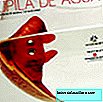
We recently commented that preeclampsia was related to autoimmune genes, and a new study has found a genetic link with the disease. US scientists have identified genetic errors that increase the risk of a pregnant woman developing preeclampsia.
This disease, which affects one in ten pregnant women, is potentially dangerous, and is characterized by causing an increase in blood pressure and an increase in protein in the urine. It carries the risk of causing seizures, stroke, kidney and liver injuries, respiratory problems and even death of the fetus and mother.
Researchers at the University of Washington, in St. Louis, analyzed DNA from more than 300 pregnant women, finding that some of the cases of preeclampsia are linked to defects in the DNA. Sixty of the women were healthy but were hospitalized because they had developed severe preeclampsia.
The other 250 women were hospitalized for other health complications, and among these, 40, also developed preeclampsia. DNA analyzes revealed genetic errors in five of the women in the group of 60 healthy patients and in seven of the 40 patients classified as having high-risk pregnancy who developed preeclampsia.
The scientists discovered that the genes in which these errors were identified, called MCP, factor I and factor H, play a role in the regulation of the immune response and believe that this could explain their possible link with preeclampsia.
The data that emerge from this study seem to confirm that some immune system problems could cause many cases of preeclampsia because women who suffer from autoimmune diseases have a higher risk of developing the disease.
Though the cases of identification of preeclampsia by these genes would only reach 15% According to the researchers, it is another step to understand the disease and continue making discoveries about it.
The study, published in "PLoS Medicine", has had the collaboration of other universities around the world. And, although more research is needed in this regard, the discovery of these genetic errors related to preeclampsia It could lead in the future to new treatments or tests to identify women who are at risk of the disorder.












